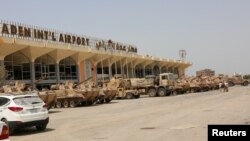Reports from an unnamed United Arab Emirates (UAE) official said Abu Dhabi is redeploying some of its forces inside Yemen as part of a strategy to pursue dialogue.
But despite the reports that the UAE is repositioning to move from "a strategy of war to a strategy of peace," Emirati government TV said the country will remain part of the Saudi-led coalition.
Saudi-led coalition spokesman Turki al Maliki also said Monday at a press conference the UAE would "remain part of the coalition" led by Riyadh.
A Yemen-based TV station reported several days ago that the UAE was withdrawing the bulk of its forces from areas adjacent to the large Red Sea port of Hodeida, amid friction over efforts to demilitarize the area. The TV station said the UAE was closing a large base in the region of Mukha, south of Hodeida.
Both the Houthi militia group, which controls Hodeida, and the internationally-recognized government of President Abdrabu Mansour Hadi, agreed in Stockholm in December to withdraw from Hodeida and allow the U.N. to administer the port, which is a key lifeline to the capital Sanaa. Months of bickering ensued, despite minor progress.
Arab media showed video of UAE tanks and armored personnel carriers withdrawing from areas near Hodeida in recent days. A Kuwaiti analyst told Arab media the UAE's re-deployment "involves mostly equipment." He said the UAE "works with local Yemeni militia forces" and "has few forces of its own in the area."
Deifallah Shami, who is minister of information for the Houthi-led administration in Sanaa, told Arab TV he did not think the UAE is withdrawing, but rather is "leveraging its position with the Saudis"
He claimed [Houthi-led forces] routed the [Saudi coalition] and that both the Saudis and the Emiratis are trying to find an exit to the impasse they are in. He also claimed the Saudis and Emiratis are bickering over what strategy to pursue in the portions of Yemen that they control.
Hilal Khashan, who teaches political science at the American University of Beirut, said the UAE "has for the most part achieved its objectives in Yemen."
"Therefore," he told VOA, "there is no further need to maintain heavy equipment and a sizeable military presence. In addition, the presence of a large UAE contingent might tempt the Saudis to apply pressure on them to engage in more fighting, and the Saudi agenda differs from the UAE agenda in Yemen."
Khashan added that the "Emiratis are in firm control of Aden and Socotra [island]," and that "these are the areas of vital interest to them [because] the UAE is trying to become a maritime power and to establish themselves in the Horn of Africa and Yemen." "Their interests are very specific," he said, "unlike [those of] the Saudis."
Khattar Abou Diab, who teaches political science at the University of Paris,said the UAE "may simply be trying to lower its profile in Yemen," given current tensions between the U.S. and Iran.
But he said the "possibility that the UAE may have come to some sort of modus vivendi with Iran" to stay out of any potential conflict, cannot be ruled out.
Several oil tankers were sabotaged off the coast of Fujeirah last month. UAE officials claimed Iran was behind the attacks. A U.S. drone based in Abu Dhabi also was shot down by Iranian forces in the Gulf of Oman last month.




